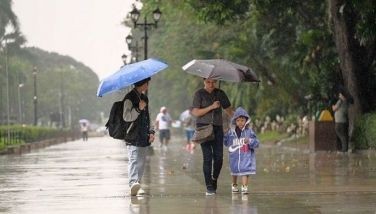Bill imposing additional tax on tourists opposed
January 10, 2006 | 12:00am
The passage of a law that would impose additional taxes on tourists may undercut the Philippines’ bid to lure three million foreign visitors to the country this year, members of the tourism industry warned yesterday.
Members of the Hotels and Restaurants Association of the Philippines (HRAP), Manila-Japan Travel Agencies and Hoteliers Association (MJTAHA), National Association of Independent Travel Agencies (NAITAS), Travel Cooperative of the Philippines (TCP) and Air Safety Foundation of the Philippines (ASFP) expressed strong opposition to the measure proposed by former tourism secretary and Sen. Richard Gordon.
NAITAS and TCP chairman Robert Lim Joseph said most members of the tourism industry, particularly small and medium-size travel agencies, were never consulted about the bill.
Joseph said the intention of the proposed legislation may be good but it has many flaws that could prove detrimental to the local tourism industry if enacted into law.
One of the provisions the industry strongly objects to is the imposition of a $5 (P250) "tourism fee" on each tourist for each night they stay in hotels, lodges or inns here.
The proposed tourism fee would add another burden, not only to tourists but to hotel operators as well, Joseph said.
"The imposition of the fee will adversely affect the hotels’ competitive edge in the ASEAN (Association of Southeast Asian Nations) region and discourage tourists from coming to the country due to high costs," he said.
MJTAHA president Teody Espallardo said another proposal in the Gordon bill seeking to give the Department of Tourism (DOT) control over local tourism enterprises would kill the industry.
"Requiring tourism enterprises to undergo regular accreditation by the DOT would only spawn graft and corruption as (has) happened in the past," Espallardo said.
Tourism Secretary Joseph Ace Durano, however, allayed fears over the proposed law, which he said is still under deliberations by both the House and the Senate.
"No bill is ever passed in its original form," Durano said. "The proposed measure would still have to undergo certain changes and all concerned sectors would be consulted to ensure that all would benefit from its passage."
Durano added that the DOT is strongly supportive of the proposed measure aimed at further improving the country’s tourism industry.
Meanwhile, the Philippine Travel Agencies Association (PTAA) favors the proposed Tourism Act of 2005 and has urged lawmakers to pass it in order to solve the government’s financial difficulties in promoting the country’s tourist destinations in the global market.
"First and foremost, the bill strengthens the DOT structurally, rationalizes its offices and operations, brings in investments through the proposed Tourism Enterprise Zone Authority (TEZA) and sets policies and standards for all tourism establishments," PTAA president Jose Clemente III said.
Under the Gordon measure, the Tourism Philippines campaign will be financed through a tourism promotion and development fund created to receive proceeds from investment earnings, travel taxes, 50 percent of net income from Duty Free Philippines, 25 percent of net income from the Philippine Amusements and Gaming Corp. (Pagcor), the country’s international airports and seaports, a portion of the accommodation bills paid by tourists and the annual appropriation of P500 million for five years, representing the budget formerly allocated to the DOT’s bureaus for Domestic and International Tourism Promotions.
"So far, the only contentious issue is the proposed room tax, which should not exceed $5 (P250) per room but is feared to raise hotel rates," Clemente said. "Our latest deliberations on the matter are of the consensus to scale (the proposed tax) down to $3 (P150) for the big hotels and $2 (P100) for the smaller ones. Still, that amount, which will be used for tourism promotion, will return to them in the form of higher occupancy rates or business volume."
Members of the Hotels and Restaurants Association of the Philippines (HRAP), Manila-Japan Travel Agencies and Hoteliers Association (MJTAHA), National Association of Independent Travel Agencies (NAITAS), Travel Cooperative of the Philippines (TCP) and Air Safety Foundation of the Philippines (ASFP) expressed strong opposition to the measure proposed by former tourism secretary and Sen. Richard Gordon.
NAITAS and TCP chairman Robert Lim Joseph said most members of the tourism industry, particularly small and medium-size travel agencies, were never consulted about the bill.
Joseph said the intention of the proposed legislation may be good but it has many flaws that could prove detrimental to the local tourism industry if enacted into law.
One of the provisions the industry strongly objects to is the imposition of a $5 (P250) "tourism fee" on each tourist for each night they stay in hotels, lodges or inns here.
The proposed tourism fee would add another burden, not only to tourists but to hotel operators as well, Joseph said.
"The imposition of the fee will adversely affect the hotels’ competitive edge in the ASEAN (Association of Southeast Asian Nations) region and discourage tourists from coming to the country due to high costs," he said.
MJTAHA president Teody Espallardo said another proposal in the Gordon bill seeking to give the Department of Tourism (DOT) control over local tourism enterprises would kill the industry.
"Requiring tourism enterprises to undergo regular accreditation by the DOT would only spawn graft and corruption as (has) happened in the past," Espallardo said.
Tourism Secretary Joseph Ace Durano, however, allayed fears over the proposed law, which he said is still under deliberations by both the House and the Senate.
"No bill is ever passed in its original form," Durano said. "The proposed measure would still have to undergo certain changes and all concerned sectors would be consulted to ensure that all would benefit from its passage."
Durano added that the DOT is strongly supportive of the proposed measure aimed at further improving the country’s tourism industry.
Meanwhile, the Philippine Travel Agencies Association (PTAA) favors the proposed Tourism Act of 2005 and has urged lawmakers to pass it in order to solve the government’s financial difficulties in promoting the country’s tourist destinations in the global market.
"First and foremost, the bill strengthens the DOT structurally, rationalizes its offices and operations, brings in investments through the proposed Tourism Enterprise Zone Authority (TEZA) and sets policies and standards for all tourism establishments," PTAA president Jose Clemente III said.
Under the Gordon measure, the Tourism Philippines campaign will be financed through a tourism promotion and development fund created to receive proceeds from investment earnings, travel taxes, 50 percent of net income from Duty Free Philippines, 25 percent of net income from the Philippine Amusements and Gaming Corp. (Pagcor), the country’s international airports and seaports, a portion of the accommodation bills paid by tourists and the annual appropriation of P500 million for five years, representing the budget formerly allocated to the DOT’s bureaus for Domestic and International Tourism Promotions.
"So far, the only contentious issue is the proposed room tax, which should not exceed $5 (P250) per room but is feared to raise hotel rates," Clemente said. "Our latest deliberations on the matter are of the consensus to scale (the proposed tax) down to $3 (P150) for the big hotels and $2 (P100) for the smaller ones. Still, that amount, which will be used for tourism promotion, will return to them in the form of higher occupancy rates or business volume."
BrandSpace Articles
<
>
- Latest
- Trending
Trending
Latest
Trending
Latest
Recommended
December 29, 2024 - 12:00am






























